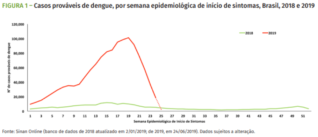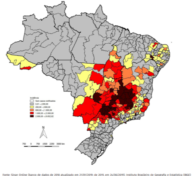- by Alison
Dengue in the Brazil: A surge in cases in 2019
What’s behind Brazil’s 2019 dengue?
Brazil is facing one of its worst dengue outbreaks in recent years. During the first six months of 2019, case numbers have risen to seven times those seen during the same period in 2018. Fatalities, meanwhile, are six times higher. So, exactly what is happening in Brazil?
Brazil looked to be winning the battle against dengue. Case numbers had fallen six-fold from around 1.5 million in 2016 and 2015 to around 250,000 in 2018 and 2017. Deaths had fallen too, from nearly 900 in 2015 to around 600 in 2016, then around 150 in both 2017 and 2018.
Dengue fights back in Brazil

[Source]
The epidemic looks to have peaked. The majority of cases were recorded between the end of March and early May, tying in with Brazil’s rainy season which, according to the International Association for Medical Assistance to Travellers (IAMAT), runs from January through to May.
Dengue hits Brazilian cities the hardest
Minas Gerais and São Paulo in the south-east of Brazil reported the most cases, around 400,000 each, according to the official report from the Brazilian Health Ministry. While incidence rates are highest in Minas Gerais, case numbers are highest in São Paulo.
 Dengue is suspected of striking down almost two per cent of the inhabitants of Minas Gerais, that’s one in every 50 people. Next hardest hit is Goiás in the mid-west where the virus has infected 1.3 per cent of inhabitants. Located in the western limits of the northern region of Brazil, the rural state of Acre we reported on last year is seeing an incident rate of just over 0.5 per cent.
Dengue is suspected of striking down almost two per cent of the inhabitants of Minas Gerais, that’s one in every 50 people. Next hardest hit is Goiás in the mid-west where the virus has infected 1.3 per cent of inhabitants. Located in the western limits of the northern region of Brazil, the rural state of Acre we reported on last year is seeing an incident rate of just over 0.5 per cent.
The famous Brazilian city of São Paulo has an incidence rate of just below 0.9 per cent, with nearly 400,000 suspected cases in 2019 – a 40-fold increase on the 10,000 suspected cases in the first six months of 2018. The city has also seen a significant increase in cases of severe dengue, from nine in 2018 to 245 in 2019, and fatalities, from seven to 167.
Across the country, cases of severe dengue are up three-fold, from 246 in the first half of 2018 to 800 in 2019; fatalities are similarly up from 129 to 414. The elderly are most at risk with more than half of deaths in the 60+ age group. Fatality rates among people aged 80+ have reached 0.69 per cent.
The dengue fatality rate among the general population, however, has been dropping steadily over the years, from 0.069 per cent in 2014 to 0.032 per cent in 2019.
What’s behind Brazil’s latest dengue epidemic?
An article in the Financial Times raises concerns that global warming is allowing dengue fever to circulate longer in the region. Ester Sabino, a professor at the Institute of Tropical Medicine at the University of São Paulo, is quoted as saying: “We have had more days with high temperatures, so mosquitoes continue to multiply.”
The article also highlights the potential impact of recent outbreaks of Zika, particularly in São Paulo: “Some scientists have argued that the current outbreak of dengue […] can be attributed to the spread of Zika, which they say left Brazilians more susceptible to the tropical illness.”
Other scientists, the FT reports, don’t agree; instead of pointing to “increasingly extreme weather patterns, including soaring temperatures and high volumes of rain, as well as the emergence of a new strain of dengue from the Caribbean.”
Meanwhile, a HuffPost article highlighting the ‘dramatic dengue epidemic’ quotes infectiologist Kléber Luz, director of the Brazilian Society of Infectious Diseases (SBI), as saying the epidemic is “mainly due to lack of control of the mosquito”.
With the country similarly facing a sharp rise in cases of chikungunya and Zika, it’s clear that the Aedes mosquito continues to be a problem. The cause, however, is not so easy to pinpoint.
Are you currently in Brazil? Tell us what you feel needs to be done to combat dengue in your community this year.

